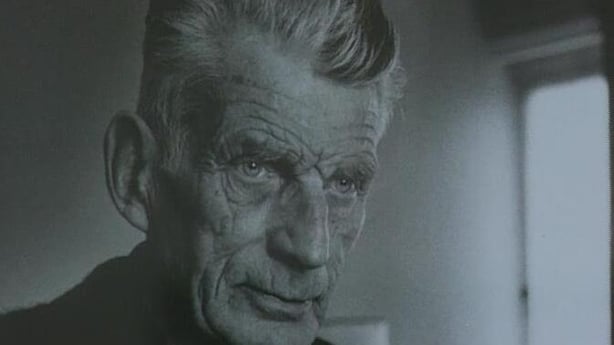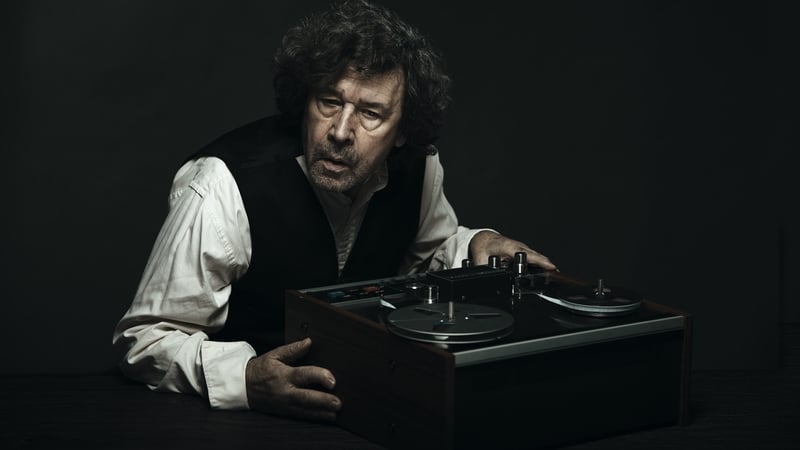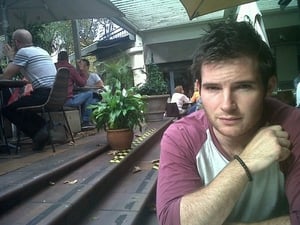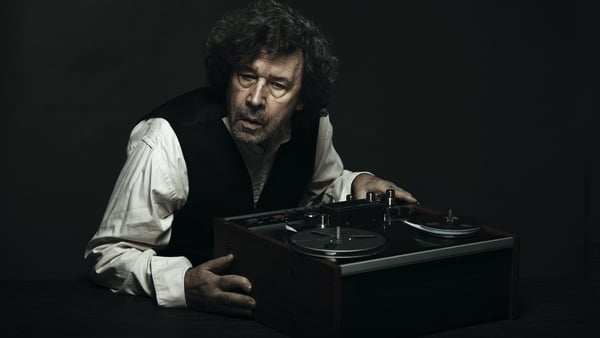Samuel Beckett’s character Krapp uses a tape recorder as a memory device to allow us to contemplate his life from different vantages on a strikingly illuminated stage in the Project Arts Centre.
This production of Krapp’s Last Tape, directed by Vicky Featherstone, sees Landmark Productions celebrating twenty years of making distinctive theatre back where it all started for them in 2004.
The ingenious theatrical conceit of the tapes has intrigued certain actors over the years - they have prepared for the role of Krapp well in advance by recording themselves. Twelve years ago, Stephen Rea recorded himself doing the younger Krapp at thirty-nine, the age Krapp is on the first spool we hear, in the hope that he would be offered the part in the future. He put the recordings away in some drawer and thought little of it. That was until Landmark's creative director, Anne Clarke, approached him about this show and he dug them out with trepidation. In many ways he was already well along the journey of playing Krapp – the play opens with Krapp rooting in the desk drawers on stage to reveal a banana in one and a reel of tape from his past in another.
We need your consent to load this rte-player contentWe use rte-player to manage extra content that can set cookies on your device and collect data about your activity. Please review their details and accept them to load the content.Manage Preferences
Listen: Director Vicky Featherstone talks to RTÉ Arena
What this foresight in doing the recordings ensures is a contrast in the timbre of the younger voice that we hear on the tape compared with the older actor in front of us in a move guaranteeing authenticity. By taping himself, Stephen Rea has recreated exactly Beckett’s conceit in allowing us to watch the older man agonise as he listens to his younger self, "Just been listening to that stupid bastard I took myself for thirty years ago, hard to believe I was ever as bad as that."
We need your consent to load this YouTube contentWe use YouTube to manage extra content that can set cookies on your device and collect data about your activity. Please review their details and accept them to load the content.Manage Preferences
Krapp cringes at the pompous confidence and naivety that he hears emanating from the tape machine. He also scoffs at the aspirations, one of which is to drink less, before he lists off the statistics of the amount of time he subsequently spent in licensed premises.
The play can be broken down into three different parts. There is the setup, the listening to the tapes and the final speaking part, which is the recording of Krapp’s last tape. As the title gives away, this will be his last birthday, the final exercise in chronicling his life. Beckett immediately removes the sentimentality of this by using one of vaudeville comedy’s oldest gags as Krapp slips on the peel of the banana he’s just eaten from the drawer.

On the recordings we are getting sparse memories and a few vivid scenes that were committed to the spools when it came time for the birthday stock-taking tradition. Spooools, a word that Rea luxuriates over at the desk on the Project stage, enjoying the sounds of the syllables as he rolls them around his mouth. What are we meant to do when faced with our memories and the things we hold onto from our lives; how does Krapp make sense of them as they recur here on the tapes? These are universal questions. However, the pursuit of happiness is a rarely acknowledged goal of a Beckett character, yet Krapp alludes to missing an opportunity.
One note Krapp reads from his ledger is about an episode he calls Farewell to love, it’s the recurring scene that seems to plague him. The word that he looks up in the dictionary is viduity, the state of being or remaining a widow or widower. "Could have been happy with her, up there on the Baltic, and the pines, and the dunes [Pause.] Could I? [Pause.] And she?"
We need your consent to load this rte-player contentWe use rte-player to manage extra content that can set cookies on your device and collect data about your activity. Please review their details and accept them to load the content.Manage Preferences
Listen: Krapp's Last Tape reviewed by RTÉ Arena
Much of the action in the setup scene is steeped in clownish, deliberate vaudeville humour. Krapp’s shoes are oversized white boots - at different times he plods in short steps off-stage to get the stack of tapes and the ledger, or to retrieve a huge dictionary, or to gulp some water and relieve his prostate.
The play text itself is slight, coming in at nine pages long, almost half of which are stage directions and descriptive detail from the playwright rather than character speech. The directions are typical Beckett, fastidious and exactly how he wants it delivered. Director Featherstone is meticulous in rendering the physical action and creating the space Beckett demands.
Beckett's work when treated with this creative care captures a universal human essence
Rea is undoubtedly the star turn but what is remarkable is how much is done through the simple yet evocative stage lighting. When the curtain comes up, we see a chute of light that runs in a corridor at an angle from a doorway at the back towards a white rectangle where the desk is situated. Initially it is hard to decipher whether it is just the light creating the effect of it being raised up but in fact this runway and desk area are sitting about a foot off the ground. The surrounding space below serves to gather Krapp's debris. What is remarkable is how much is done with so little; this refined communication is central to Beckett’s theatre.
The future is where the action is set, which is always a hopeful place for those of us still on this old muckball. As such, January is a fitting time to stage the play considering the new year and that audiences may be doing some self-evaluating themselves and have a few resolutions still intact - dry January, perhaps. After all Beckett is the playwright who in 1984 responded to a request from The Times London for his resolutions for the year ahead with a telegram that read, verbatim: "resolutions colon zero stop period hopes colon zero stop Beckett"
We need your consent to load this rte-player contentWe use rte-player to manage extra content that can set cookies on your device and collect data about your activity. Please review their details and accept them to load the content.Manage Preferences
Listen: Stephen Rea talks Krapp's Last Tape on The Brendan O'Connor Show
Beckett’s work when treated with this creative care captures a universal human essence, this coupled with the stature of Stephen Rea in the eyes of Irish audiences ensures that this is a theatrical event for those who can get their hands on tickets. The Last Modernist himself would have approved.
The sell-out run is set to end in the Project on February 3rd, but like many successful Landmark Productions shows expect this to tour the country and even further afield.


